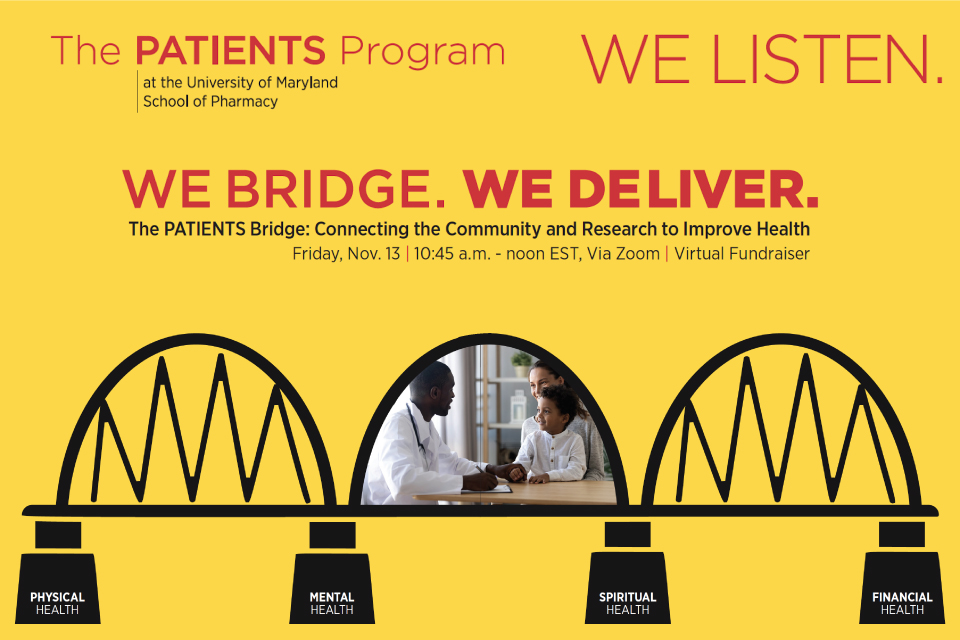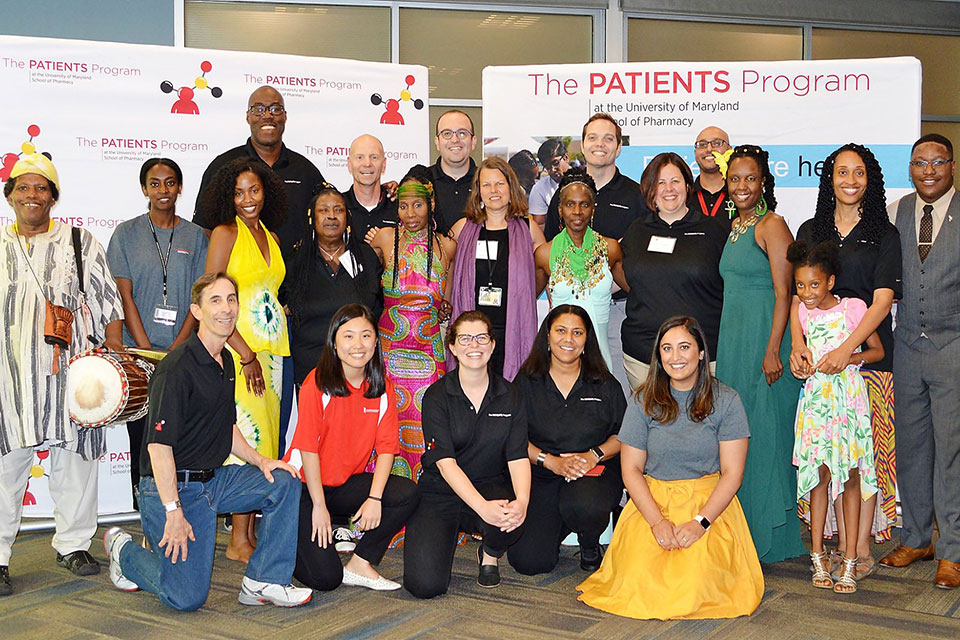The PATIENTS Program Hosts First-Ever Community Research Jam
Inaugural event helps amplify the community’s voice and demonstrates the value of early engagement in research.

By Malissa Carroll
October 7, 2020
The PATIENTS Program at the University of Maryland School of Pharmacy hosted its first-ever Community Research Jam on Sept. 10. Organized in collaboration with the University of Maryland, Baltimore (UMB) Institute for Clinical & Translational Research’s (ICTR) Community and Collaboration Core, the event aimed to demonstrate the value of early engagement in research.
Early engagement – also known as “pre-engagement” – is the term used to describe the process of researchers engaging community leaders before receiving funding for a project, allowing them to start building relationships with communities before the research even begins.
“Too often, researchers wait to reach out to community leaders until their project doesn’t seem to be going as planned,” says C. Daniel Mullins, PhD, professor and chair of the Department of Pharmaceutical Health Services Research (PHSR) and executive director of The PATIENTS Program at the School of Pharmacy. “At that point, community partners might feel that the research could have been designed to be more relevant, but it is difficult to change the project midstream. Engaging the community upfront can help researchers develop new projects in a way that is more relevant and meaningful to patients and community members.”
Mullins, who also serves as director of the UMB ICTR Community and Collaboration Core, adds, “The idea of the Community Research Jam is to engage the community while the research is being composed, in much the same way that a musical jam session brings together various artists to create a new song or album together.”
The Community Research Jam featured presentations from three researchers across UMB. Because the goal of the event was for the researchers to listen more than they spoke, each presentation was limited to five minutes. After each presentation, a panel of community leaders had 10 minutes to ask questions and provide constructive feedback about the project’s aims and study design. The unique format of the event stems from The PATIENTS Program’s vision statement, which envisions a world in which patients and stakeholders are heard, inspired, and empowered to co-develop patient-centered outcomes research (PCOR).
The three researchers who presented during the event included Luana Colloca, MD, PhD, MS, associate professor of pain and translational symptom science at the University of Maryland School of Nursing; Mohummad Minhaj Siddiqui, MD, associate professor of surgery and director of Urologic Oncology and Robotic Surgery at the University of Maryland School of Medicine; and M. Gerard-Paul Slobogean, MD, MPH, FRCSC, associate professor and director of clinical research for the Department of Orthopaedics at the School of Medicine.
Colloca’s presentation spotlighted her project titled “Patient-Centered Chronic Orofacial Pain Management: Optimizing the Brain’s Natural Pharmacy,” which aims to compare two evidence-based biobehavioral therapies – cognitive behavioral therapy and open-label placebo – to each other and their combination in a pragmatic eight-week intervention and six-month follow-up trial. Siddiqui spoke about his project titled “Prioritization of Comparative Effectiveness Research (CER)/Patient-Centered Outcomes Research (PCOR) on Prostate Cancer Active Surveillance (AS): Community Consensus Initiative,” which will bring together patients, health care providers, and advocacy organizations to help researchers understand why some men who are diagnosed with prostate cancer and eligible for active surveillance do not pursue it. Slobogean presented his HIP-ATTACK-2 study, which seeks to understand whether it is better for patients with a broken hip and heart damage to go into surgery right away or wait until doctors are able to perform additional clinical assessments to determine their overall heart health.
All three ideas are still in the proposal phase, so there remains sufficient time to incorporate input from the community to change how the projects are designed and implemented.
“Participating in the Community Research Jam was a truly unique experience that provided some exceptional insights into ways that I could improve my research project,” says Siddiqui. “The access that this event offered to meaningful feedback from thoughtful community panelists was invaluable, and would be otherwise quite difficult to come by. I’m very appreciative of The PATIENTS Program for putting together this opportunity and allowing me the chance to participate.”
Community panelists who participated in the event included Sam Ross, MD, chief community health officer for Bon Secours Mercy Health; Franklin Lance, DMin, senior pastor at Mt. Lebanon Baptist Church; and Jacqueline Caldwell, president of the Greater Mondawmin Coordinating Council. Each panelist carefully listened to the presentations and provided advice and support to the researchers based on their experience engaging their own communities to improve health.
“It was an honor to participate in Dr. Mullins’ inaugural Community Research Jam and interact with some outstanding faculty members who are committed to improving the community research experience,” says Ross. “Each proposal we heard has a real opportunity to be inclusive of under-represented minority communities, and the outcomes could introduce clinical interventions that address health inequities and improve quality of life for all members of our communities. I commend Dr. Mullins and the other researchers for their commitment to incorporating diversity, equity and inclusion, and authentic community engagement in their research.”
“During the global COVID-19 pandemic, it has become abundantly clear how important patient-centered research and science are to our well-being,” adds Lance. “I support the critical and transformative work underway via The PATIENTS Program, and appreciate this opportunity to hear from three principal investigators whose work has the potential to better the lives of many by ensuring that the voices of study participants are being heard, valued, and incorporated into the research process at all stages. Thank you to the researchers who participated for understanding that our voices, and not just our bodies, have value.”
Initially funded with a $5 million grant from AHRQ, The PATIENTS Program is committed to listening to the voice of the community, bridging research and the community, and delivering solutions that are important to the community. The program works to build partnerships with local, regional, and national patient communities and health care systems; conduct and expand PCOR to help patients make more informed health care decisions. To learn more about The PATIENTS Program, visit its website at patients.umaryland.edu.



